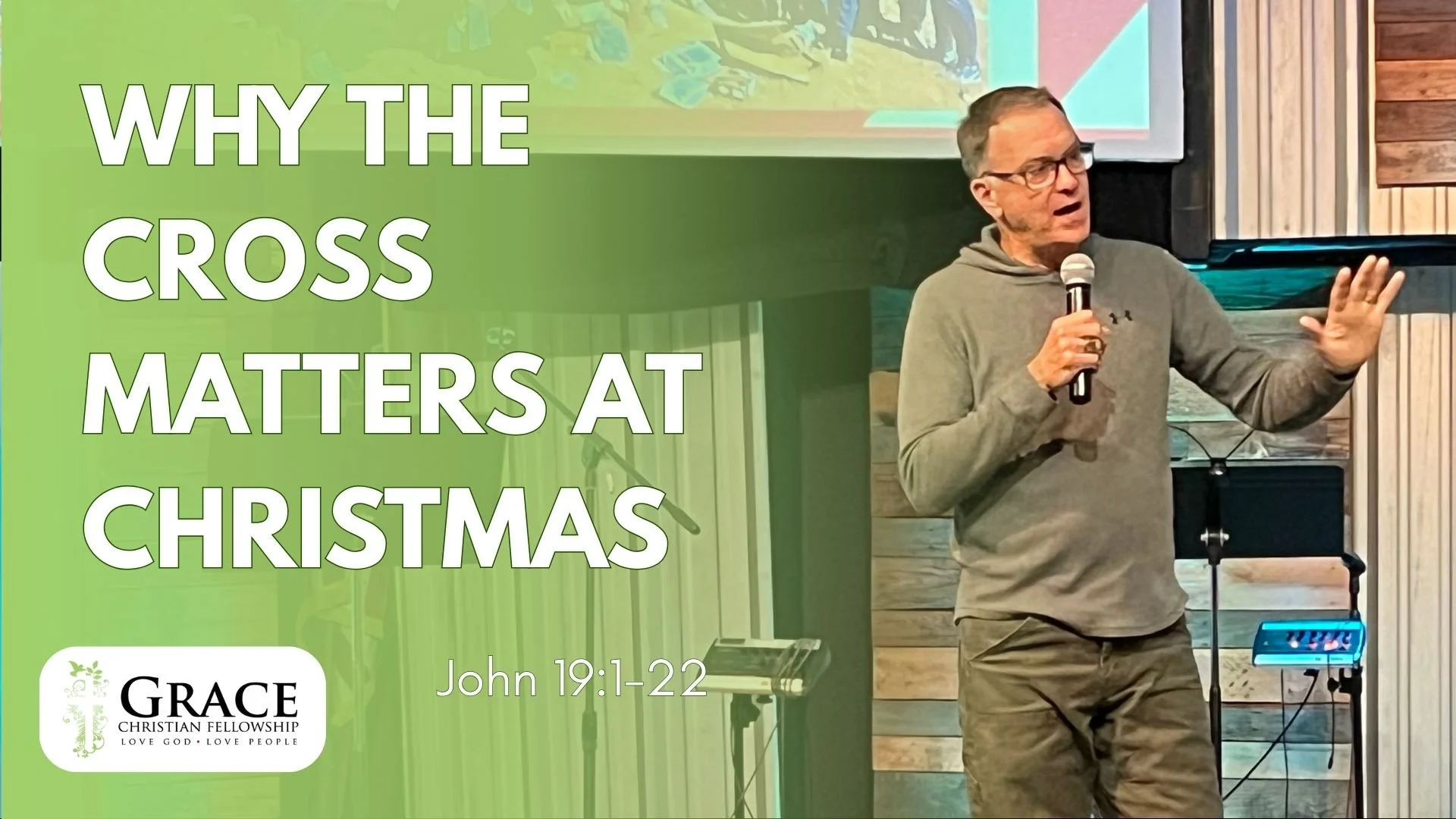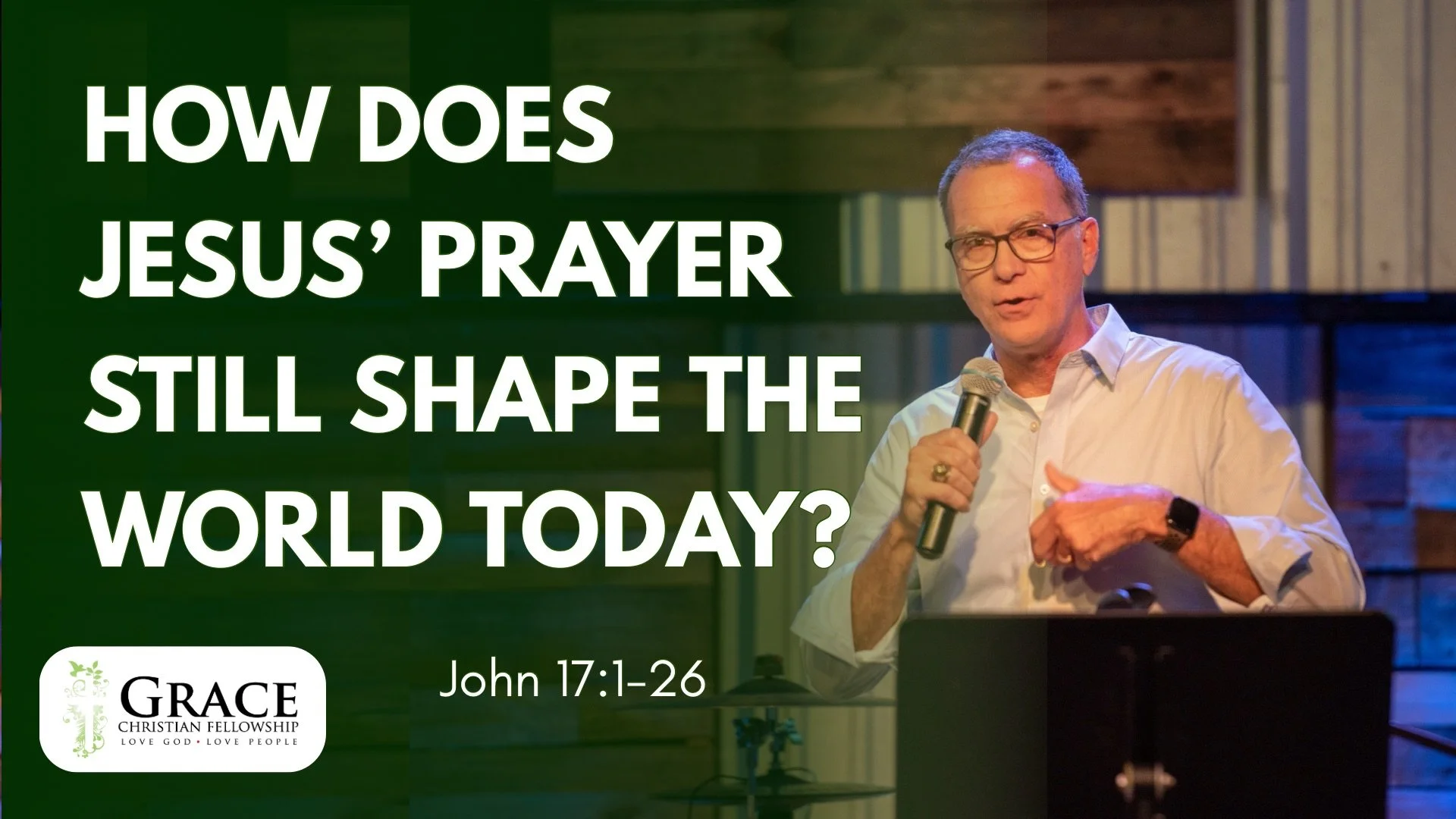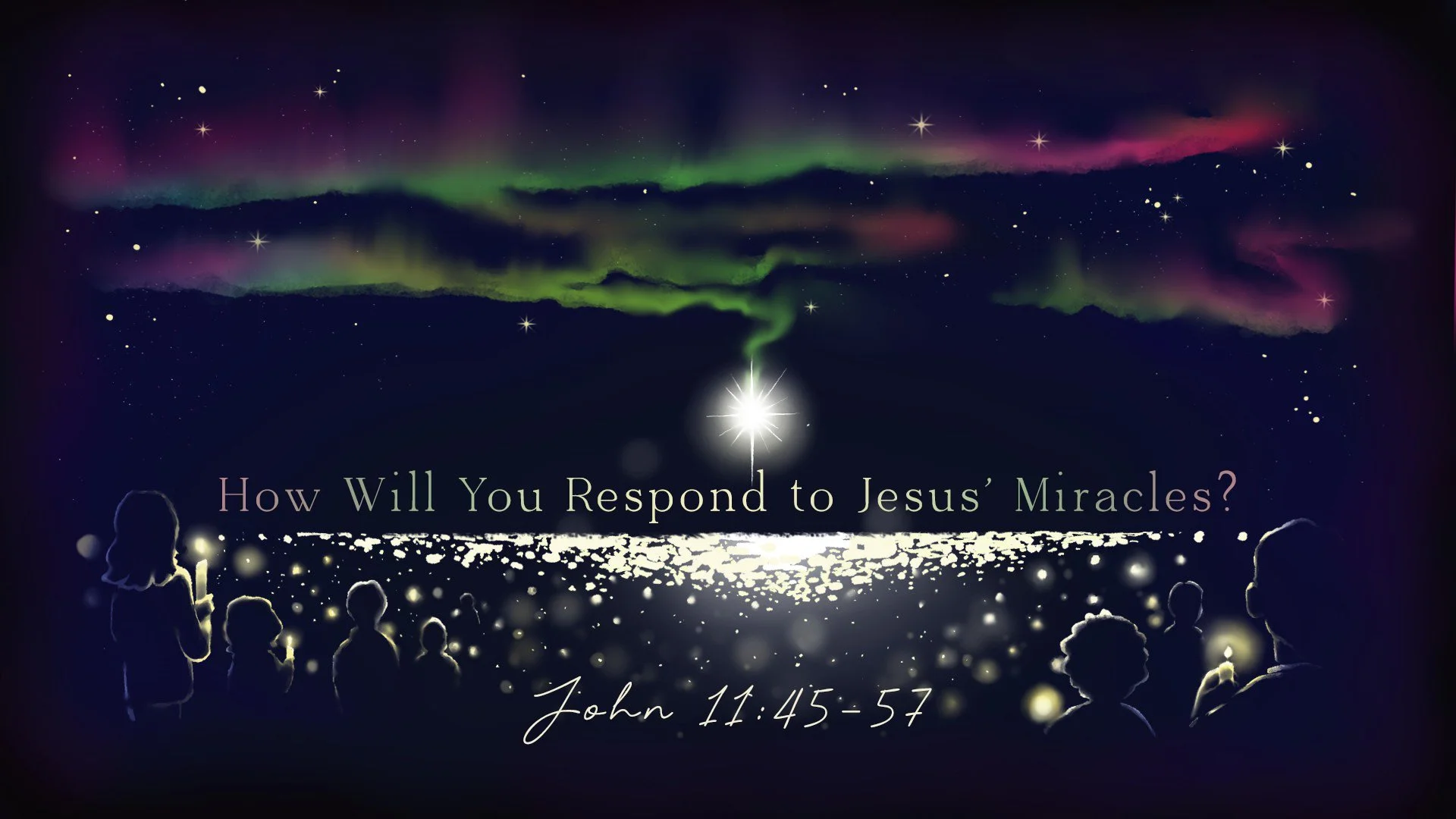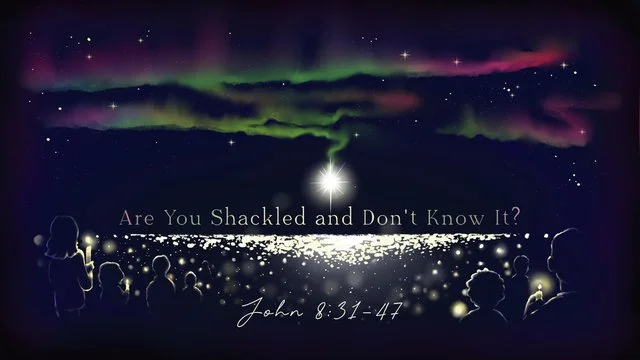Series: Signs & Glory
Title: Why the cross matters at Christmas
Scripture: 📖 John 19:1-27
Galatians 2:20
John 18:37
Preacher: Darien Roger Gabriel
Bottom Line: "The life I now live in the body, I live by faith in the Son of God, who loved me and gave himself for me.”
INTRODUCTION
CONTEXT
📖 SERMON OUTLINE
CONCLUSION
NOTES
QUESTIONS TO CONSIDER
DISCUSSION QUESTIONS
🎥 YOUTUBE DESCRIPTION
MAIN REFERENCES USED
Opening prayer: Lord God, help us grow to be and do like Jesus, while abiding in him and leading others to do the same.
INTRODUCTION
Hard seasons for us:
Grandparents funeral as a kid.
Break-ups in high school, college.
Divorce of my parents.
Failure at work; crisis of faith in my career choice.
Calling out of engineering into the ministry.
Children.
4 month old daughter in the hospital.
Marriage challenges.
Car accidents.
Death of my father.
Near death of my mother.
Accident Christmas 3 years ago.
To varying degrees, these have all been crises of faith for me. And while it was not always conscious on my part, my faith in Christ carried me through every one of them.
The one that it carried me through most intentionally was my father's death and funeral services. Because I had to process those quickly enough to speak at both funeral services.
Death is a spiritual sucker punch. You know it's coming but you don't know exactly when it's coming or how it will land...until it does.
When you get sucker-punched, what will you turn to? What will help explain the pain and meaning in life?
I believe it was my faith in the death, burial and resurrection of Jesus Christ.
The Apostle Paul put it this way:
“I have been crucified with Christ and I no longer live, but Christ lives in me. The life I now live in the body, I live by faith in the Son of God, who loved me and gave himself for me."
Galatians 2:20 NIV
This is what carried me through some dark days.
It can carry you too...if you let it. If you let HIM.
Let's see how.
CONTEXT
At this point in the life of Jesus, he's looking at the cross full-on. It's the first Good Friday, if you will. He's about to die physically, yes. But he's also about to take on the sins of the world. He's about to take on all of my sin (past, present, future) and your sin. And it will kill him and separate him from fellowship with his Father which he's had for all eternity and will never lose again.
SERMON OUTLINE
““You are a king, then!” said Pilate. Jesus answered, “You say that I am a king. In fact, the reason I was born and came into the world is to testify to the truth. Everyone on the side of truth listens to me.””
John 18:37 NIV
Bottom Line
“The life I now live in the body, I live by faith in the Son of God, who loved me and gave himself for me.”
The Heart of the Sermon
Christmas only makes sense when viewed through the cross.
Jesus is not simply born to inspire us—
He is born to give Himself.
In John 19, Jesus is crowned, judged, rejected, and lifted up as King.
Not on a throne—but on a cross.
And that kingship explains everything about Christmas.
Simple Movement of the Text
1. Jesus Is Revealed as King (John 19:1–5)
Mocked, beaten, crowned with thorns—
Yet He stands silent, sovereign, unthreatened.
This is what God’s glory looks like.
2. Jesus Is Rejected by the World (John 19:6–16)
Pilate knows the truth but lacks the courage to live by it.
The crowd chooses Caesar over Christ.
Kingship is denied—but not undone.
3. Jesus Is Declared King for All to See (John 19:17–22)
The sign above the cross tells the truth even when no one wants it to.
God writes His verdict where no one can erase it.
Why This Matters at Christmas
Jesus did not come simply to be admired in a manger.
He came to be given on a cross.
That’s why Galatians 2:20 belongs here:
• Christmas answers who Jesus is
• The cross answers why He came
• Faith answers how we now live
Closing Truth
The question of Christmas is not:
Do you believe Jesus was born?
It is:
Will you live the life He died to give you?
Because the King born at Christmas
is the King who loved you
and gave Himself for you.
CONCLUSION
So why does the cross matter at Christmas? Because it matters all the time--even when we celebrate the birth of the Christ child. Especially when we celebrate the Christ child--the one who made it all possible.
“I have been crucified with Christ and I no longer live, but Christ lives in me. The life I now live in the body, I live by faith in the Son of God, who loved me and gave himself for me.”
Galatians 2:20 NIV
Notice the second part of the verse. "The life I now live in the body, I live by faith in the Son of God, who loved me and gave himself for me."
That is what carries me through the darkest days.
That is what can carry you through your darkest days.
INVITATION
What about you?
Peter puts it all in perspective in his first sermon:
““Therefore let all Israel be assured of this: God has made this Jesus, whom you crucified, both Lord and Messiah.” When the people heard this, they were cut to the heart and said to Peter and the other apostles, “Brothers, what shall we do?” Peter replied, “Repent and be baptized, every one of you, in the name of Jesus Christ for the forgiveness of your sins. And you will receive the gift of the Holy Spirit. The promise is for you and your children and for all who are far off—for all whom the Lord our God will call.”” Acts 2:36-39 NIV
How do we respond? Answer 2 questions:
Take out a card or piece of paper right now. Write down the answer to these questions:
What is God saying to me right now?
What am I going to do about it? Write this down on a sheet of paper.
What I hear you saying, Lord, is ___________________.
[my name] is going to believe/do __________________________________________________ as a result.
Finally, share this with your Home or Mission group this week when you gather as a testimony about what God is doing in your life. You don’t have to get too specific to give him praise.
Lord's Supper, 1 Cor 11:23-26 is good passage.
Also, say something like, "Christ has died, Christ is risen, Christ will come again." (past, present, and future)
Pray
NOTES
In light of John 18:37, this is a Christmas, Good Friday and Easter verse all in one.
As has been said, ‘Observe the postage stamp; its usefulness depends on the ability to stick to one thing till it gets there.’
The 4 G's
God is great. Therefore, we don't have to be in control, for God is able.
God is gracious. Therefore, we don't have to prove ourselves to other people, for God loves us just as we are.
God is good. Therefore, we don't have to find satisfaction anywhere else. For God is more than enough for me.
QUESTIONS TO CONSIDER
What do I want them to know?
Why do I want them to know it?
What do I want them to do?
Why do I want them to do it?
How do they do this?
DISCUSSION QUESTIONS
Discovery Bible Study process: https://www.dbsguide.org/
Read the passage together.
Retell the story in your own words.
Discovery the story
What does this story tell me about God?
What does this story tell me about people?
If this is really true, what should I do?
What is God saying to you right now? (Write this down)
What are you going to do about it? (Write this down)
Who am I going to tell about this?
Find our sermons, podcasts, discussion questions and notes at https://www.gracetoday.net/podcast
Alternate Discussion Questions (by Jeff Vanderstelt): Based on this passage:
Who is God?
What has he done/is he doing/is he going to do?
Who am I? (In light of 1 & 2)
What do I do? (In light of who I am)
How do I do it?
Final Questions (Write this down)
What is God saying to you right now?
What are you going to do about it?
🎥 YouTube Description
Series: Signs & Glory
Sermon Title: Forget the Reason, Misuse the Season
Scripture: 📖 John 18:37
Preacher: Darien Roger Gabriel
Every Christmas we hear the phrase “the reason for the season.”
But what happens when we forget that reason?
In this Christmas Eve message from John 18:37, Jesus tells Pilate plainly why He was born: to testify to the truth. Christmas is not just about receiving a gift—it’s about being reshaped and sent by the gift.
Through a simple but sobering illustration, we’re reminded that good gifts misused can cause real harm. When we forget the purpose of Christmas, we don’t just misunderstand it—we misuse it.
Jesus is the gift God has given the world.
But how does receiving Him change our mission, our lives, and the way we live sent into the world?
Bottom Line: 👉 When we forget the reason, we misuse the season.
This message invites us to move beyond sentimentality and into faithful witness—listening to the voice of the King who was born, crucified, risen, and who now sends His people to live and share the truth.
📖 Scripture Reading
“You are a king, then!” said Pilate. Jesus answered, “You say that I am a king. In fact, the reason I was born and came into the world is to testify to the truth. Everyone on the side of truth listens to me.”
— John 18:37 (NIV)
🙏 Opening Prayer
Lord God, help us grow to be and do like Jesus, while abiding in Him and leading others to do the same.
🔔 Subscribe & Share
If this message encouraged or challenged you, consider sharing it—and subscribe for more sermons from the Signs & Glory series through the Gospel of John.
📍 Grace Christian Fellowship
📅 Christmas Eve Message
MAIN REFERENCES USED
“John,” by R. Kent Hughes, Preaching the Word Commentary, Edited by Kent Hughes
Exalting Jesus in John, by Matt Carter & Josh Wredberg
The Gospels & Epistles of John, FF Bruce
John, RC Sproul
John, Köstenberger
The Gospel According to John, DA Carson
Let's Study John, Mark Johnston
The Light Has Come, Leslie Newbigin (TLHC)
The Visual Word, Patrick Schreiner (TVW)
“Look at the Book” by John Piper (LATB)
“The Bible Knowledge Commentary” by Walvoord, Zuck (BKC)
“The Bible Exposition Commentary” by Warren Wiersbe (BEC)
Thru The Bible with J. Vernon McGee (TTB)
Outline Bible, D Willmington (OB)
NIV Study Bible (NIVSB) https://www.biblica.com/resources/scholar-notes/niv-study-bible/
Chronological Life Application Study Bible (NLT)
ESV Study Bible (ESVSB) https://www.esv.org
The Bible Project https://bibleproject.com
Nicky Gumbel bible reading plan app or via YouVersion
ChatGPT AI
Read More

















